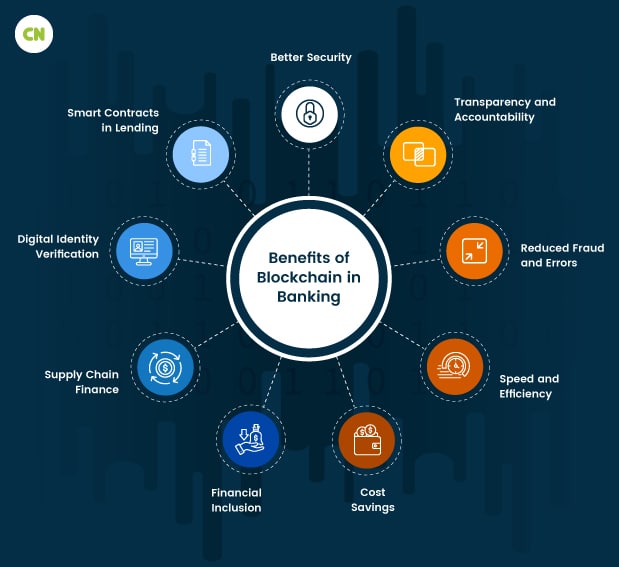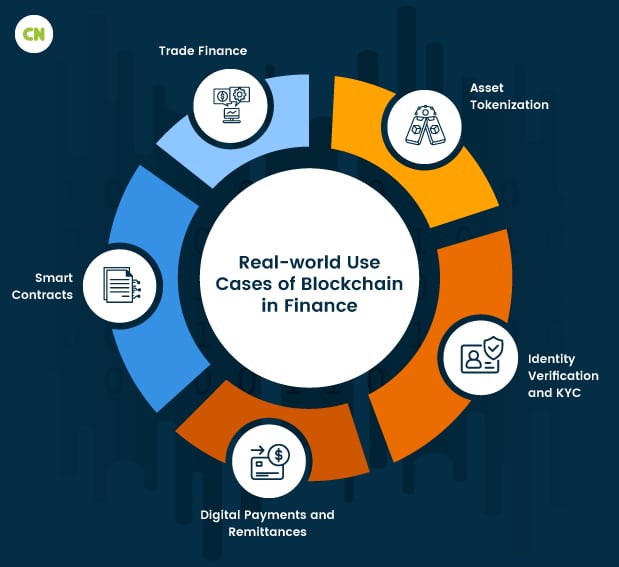In the ever-evolving landscape of financing, blockchain innovation is bringing modifications. Blockchain in banking isn’t simply a technological leap; it represents an essential shift in how monetary services run, appealing improved security, openness, and effectiveness. As blockchain improves security procedures and improves intricate operations, its effect on the market is indisputable.
Yet, incorporating blockchain into the existing banking structure isn’t simple. And this is where the value of custom-made blockchain advancement services can be found in. In the developing landscape of blockchain in banking, these custom services lead the way for customized developments that attend to particular difficulties and drive industry-wide change.
Eager to check out how blockchain can be a game-changer in banking? Keep reading.
Advantages of Blockchain in Banking
-
Better Security:
Blockchain’s decentralized and immutable journal system guarantees robust security. This makes it challenging for unapproved celebrations to damage deal information.
-
Openness and Responsibility:
It offers openness through a shared, tamper-resistant journal that guarantees responsibility amongst all individuals in the network. Deals show up to all licensed celebrations, minimizing the capacity for surprise activities.
-
Lowered Scams and Errors:
Blockchain’s cryptographic confirmation and agreement system lessen scams and mistakes in monetary procedures. Different nodes verify deals, minimizing the threat of deceitful activities.

-
Speed and Performance:
Deals on blockchain networks are much faster and can be settled in real-time. It minimizes the processing times compared to conventional banking systems. This speed adds to enhanced client experiences and quicker monetary operations
-
Expense Cost Savings:
By eliminating intermediaries and enhancing procedures, blockchain can substantially minimize functional expenses connected with conventional banking. Getting rid of third-party confirmation and reconciliation procedures leads to substantial expense savings for banks.
-
Financial Addition:
Blockchain can extend banking services to unbanked and underbanked populations. It offers them with access to monetary services and chances.
-
Supply Chain Financing:
It boosts openness and traceability in supply chains It minimizes scams and mistakes in trade financing procedures.
-
Digital Identity Confirmation:
It makes it possible for protected digital identity confirmation, enhancing client onboarding procedures and minimizing the requirement for substantial documentation. All these add to enhancing the client experience.
-
Smart Agreements in Financing:
Smart agreements automate providing procedures, minimizing documentation and speeding up loan approvals These self-executing agreements instantly impose the conditions of loans, getting rid of the requirement for manual intervention.
These advantages highlight how blockchain innovation is changing the future of banking by boosting security, effectiveness, and availability while minimizing expenses and the threat of scams.
Real-world Usage Cases of Blockchain in Financing
1 ⢠Digital Payments and Remittances
Blockchain innovation has actually changed digital payments and cross-border remittances. By leveraging blockchain’s decentralized and protected nature, banks and people can conduct deals with decreased friction It gets rid of the requirement for conventional intermediaries, resulting in much faster settlement times and expense savings. Additionally, blockchain wallets play an essential function in this environment, offering users with protected storage and access to digital properties. Blockchain has actually likewise opened doors to monetary addition by offering available digital payment options, particularly in areas with restricted banking facilities.
- Advantages: Lowered deal charges, quicker settlements, and improved monetary addition.
- Example: Ripple’s blockchain-based service, RippleNet, is extensively embraced by banks worldwide, consisting of American Express, to guarantee effective cross-border payments.
2 ⢠Smart Agreements
Smart agreements are self-executing arrangements powered by blockchain innovation, where legal conditions are encoded in code. These agreements automate numerous procedures, getting rid of the requirement for intermediaries and the threat of human mistake. By carrying out actions instantly when predefined conditions are fulfilled, wise agreements enhance operations in a number of markets, from insurance coverage claims and supply chain management to decentralized financing (DeFi) applications
- Advantages: Automation, decreased scams, and structured operations.
- Example: Ethereum, a blockchain platform, is understood for its wise agreement abilities. It hosts decentralized applications (DApps) that utilize wise agreements, consisting of loaning and decentralized exchange platforms within the DeFi environment.

3 ⢠Identity Confirmation and KYC
Blockchain offers a safe and secure and decentralized service for identity management and Know Your Consumer (KYC) procedures. You can manage your identity information while selectively sharing it with relied on celebrations. It boosts information security, streamlines onboarding, and reduces compliance expenses with a tamper-proof identity record.
- Advantages: Boosted security, streamlined onboarding, and expense savings.
- Example: The Sovrin Structure’s self-sovereign identity platform utilizes blockchain to empower people with control over their identity information. It guarantees a safe and secure and effective method to validate identities.
4 ⢠Trade Financing
Blockchain is changing trade financing with a shared, unchangeable journal for all included celebrations. It increases openness by tape-recording every deal, minimizing disagreements and scams threats By streamlining trade procedures and getting rid of paper-based documents, blockchain increases the effectiveness and security of worldwide trade.
- Advantages: Increased openness, decreased scams, and structured trade operations.
- Example: We.Trade, a consortium of twelve European banks, leverages blockchain to use trade financing services that benefit little and medium-sized business (SMEs) and services. It assists in effective and protected worldwide trade.
5 ⢠Possession Tokenization
Possession tokenization is the procedure of transforming ownership rights to real-world properties, such as realty, art, or stocks, into digital tokens on a blockchain. These tokens represent fractional ownership and can be quickly traded, boosting liquidity and availability to a more comprehensive variety of financiers Possession tokenization can change how we handle and buy properties.
- Advantages: Increased liquidity, fractional ownership, and availability to a larger variety of financiers.
- Example: Harbor, a blockchain-based platform, concentrates on tokenizing realty properties. It makes it possible for financiers to purchase and trade fractional ownership of homes, increasing liquidity in the realty market.
Difficulties of Executing Blockchain in Banking
Blockchain innovation has huge capacity for making banking more secure and much faster. However there are some issues and concerns we require to consider.
-
Regulative Difficulties
The guidelines for blockchain and cryptocurrencies are still altering. Banks need to follow these guidelines, particularly AML (Anti-Money Laundering) and KYC (Know Your Consumer) policies.
-
Scalability Problems
Bitcoin and Ethereum have actually had problem when great deals of individuals utilize them. It makes deals sluggish and costs more. These concerns need to be resolved for blockchain to manage the volume of deals in the monetary sector.
-
Security Issues
While blockchain is popular for security, it’s not unsusceptible to vulnerabilities. Smart agreement bugs, personal crucial theft, and attacks are genuine threats that can impact monetary deals.
-
Personal Privacy and Privacy
Discovering the best balance in between the openness of blockchain and the requirement for privacy in monetary deals is an obstacle. Keeping the best balance to safeguard delicate client information is important.
-
Volatility
Cryptocurrency rates can fluctuate a lot, which’s dangerous for banks with digital cash. Banks are stressed over how to manage this threat when utilizing blockchain.
-
Legal and Jurisdictional Problems
Deals on a worldwide blockchain network can trigger legal and jurisdictional difficulties. This is since various nations can have differing policies and analyses of wise agreements.
-
Resistance to Modification
It can be hard to persuade conventional banks to change to blockchain. Workers and stakeholders might not wish to alter and fret about how it will impact how they do things now.
Regardless of difficulties, blockchain holds the possible to enhance banking and financing. Banks, in cooperation with the top monetary software application advancement business, are actively dealing with its adoption and boosting security as policies end up being clearer.
Future of Blockchain in Banking
Blockchain is gradually discovering its location in banking, and there are a couple of things banks require to bear in mind. They must have the best innovation and follow the exact same guidelines internationally to make blockchain work all over.
When blockchain ends up being a worldwide requirement, it will bring lots of advantages, like more transparent banking, much faster deal processing, and lower processing expenses The future of blockchain in banking looks appealing.
Additionally, AI with blockchain is changing services In banking, AI with blockchain indicates much better security, smoother operations, and customer-friendly services. It’s not simply altering banks; it’s making them much better.
Last Ideas
Blockchain innovation holds substantial guarantee for banking and financing. While difficulties exist, the advantages are indisputable. Enhanced security, structured operations, and increased openness are amongst the changes blockchain deals. As the world approaches international standardization, the future of blockchain in banking shines vibrantly. When integrated with AI, this game-changing innovation improves banking, developing a more effective, customer-centric, and protected monetary landscape.
Do you wish to employ blockchain designers for cryptocurrency, wise agreements, or DeFi service advancement? At Capital Numbers, we provide end-to-end advancement options. Our professional designers use you quality services based on your advancement requirements which too at affordable rates. Wish to talk? Call us today!
.